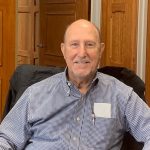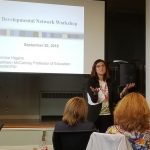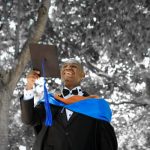No state school finance system remains adequate in perpetuity without checks and balances. Goals change as do other demands on local public schools. State school finance systems require constant evaluation and recalibration. Connecticut schoolchildren have waited far too long, especially those in the state’s low income black and Latinx communities.
The fascist riot at the U.S. Capitol is a fitting denouement of the Trump Presidency. His incitement of thousands of white supremacists, conspiracy theorists, and others caught in the thrall of his cult of personality demonstrated once and for all that there is nothing he won’t do to cling to power – and nothing some won’t do to keep him there.
Having always practiced what he preached as a professor, advisor, and coach, William “Bill” Servedio is someone who walks the walk. Perhaps more accurately, the Neag School Professor Emeritus runs the run; he appears to have spent most every day of his 78 years moving at full tilt. And in recently establishing a scholarship fund for Neag School sport management students in addition to taking part in virtual discussions with alumni from the program, he clearly has no intention of slowing down.
Supporting the rule of law by holding officials accountable, constructing an accurate account of the recent past, and recommitting to human rights at home are essential to restoring the confidence in government that underlies our shared national life. Such work can help create a new sense of community, which is a fundamental aspect of a healthy democracy.
“I don’t necessarily like to use this term in public, but … we have a generation of digital natives who are also digital doofuses,” said Don Leu, in a 2006 interview about his digital literacy research findings. “They are natives when it comes to video, social networks, and texting, but they are doofuses when it comes to information. They do not know how to locate information or evaluate information, and they do not know how to communicate information in a richer context beyond text messaging.”
The following is an excerpt from Chapter 1 of The Strategy Playbook for Educational Leaders: Principles and Processes (Routledge, 2021), a new book co-authored by Neag School Associate Professor Jennie Weiner and her colleague Isobel Stevenson, director at the Connecticut Center for School Change.
The volume is a how-to resource designed for superintendents, central office staff, principals, and teacher leaders that looks to “provide leaders with a concrete framework for a strategic improvement pan, helping educators link the ‘principles’ to ‘processes’ of planning.”
Meriden Record-Journal (Richard Schwab is quoted about Miguel Cardona’s nomination for the U.S. Education Secretary)
Through a collaboration with Lehigh University, Neag School of Education associate professor Jennifer Freeman will develop an intervention to improve college and career readiness for students with emotional and behavioral disorders. This $500,000 grant is sponsored by the Institute of Education Sciences (IES). Freeman is a Co-PI with Lee Kern and Chris Liang at Lehigh University.
Public school enrollment in New England is down during the pandemic. But even when kids are enrolled, it can be a struggle to get some to show up. This week on NEXT, how one district is tackling absenteeism and why doctors are increasingly concerned about youth mental health. Plus, Massachusetts school districts try to cope with a teacher shortage. And when a Vermonter’s business plummeted after COVID hit, she donned an inflatable T-Rex costume and started dancing.
Through a collaboration with Lehigh University, Neag School of Education associate professor Jennifer Freeman will develop an intervention to improve college and career readiness for students with emotional and behavioral disorders. This $500,000 grant is sponsored by the Institute of Educational Sciences (IES). Freeman is a Co-PI with Lee Kern and Chris Liang at Lehigh University.





